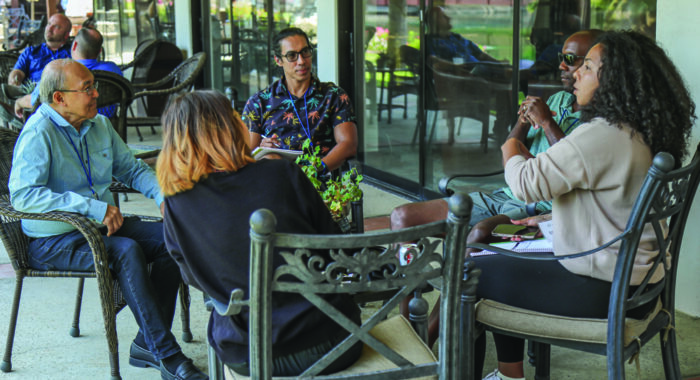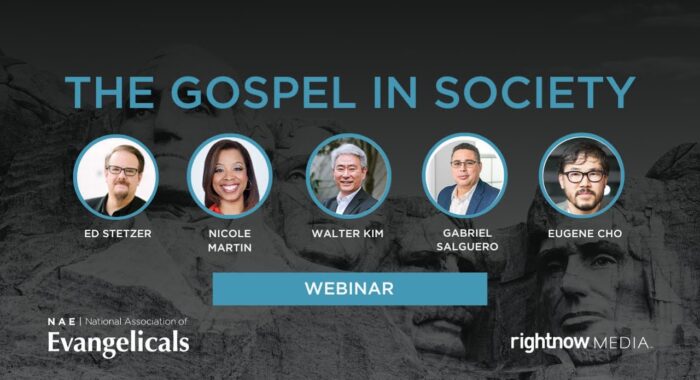In 2002, I found myself in the small crowd of a Fast Company conference, surrounded by young, like-minded Type A leaders looking to make a mark on the world. We listened as industry leaders shared insights about the future. In breakouts, we peppered experts with questions about emerging technology, changing business practices, the ideas of the future.
The energy was crisp. The people were curious. The atmosphere was intoxicating. But where were all the Christians? More to the point, why didn’t Christian thinkers have a place to gather and discuss how to participate in shaping a kingdom-influenced future?
Those questions gave rise to a simple idea. We’d create a third space where Christian leaders — both pastors and laity alike — could examine the most pressing questions of our time through the lens of the gospel. We’d call the space Q Ideas, and we wouldn’t shy away from any question, any topic, no matter how contentious.
Our foundational premise was that the gospel was sufficient to answer every angst in an increasing complex world. After all, what was the gospel but the proclamation of the kingdom of God into every broken space, which included every occupation, every sphere of influence, every economic and political sector?
If we believed that gospel truth, the practical implications were clear: The entry point of the gospel was through us — ordinary individuals following Christ in the routine places of our own lives.
Over the years, we’ve watched as our working premise came to life. We’ve seen a generation of leaders who’ve brought Christ to their board rooms, hospitals, artists’ studios, accounting firms, basketball courts, and every other place of influence.
How does this good news of the kingdom show up in their lives? It shows up through a particular posture. It shows up through a certain discipline. It shows up in practice.
The Posture: Stay Curious
Jesus came asking questions.
What good will it be for someone to gain the whole world, yet forfeit their soul? (Matthew 16:26)
Is not life more than food, and the body more than clothes? (Matthew 6:25)
Which is lawful on the Sabbath: to do good or to do evil, to save life or to kill? (Mark 3:4)
Jesus asked hundreds of questions throughout the Gospels. Even though he was God, he demonstrated a posture of curiosity. Gospel-minded leaders embody Christ’s posture of curiosity. They love asking questions, they’re hungry to understand others’ stories, and they draw them out conversationally.
Though curiosity may begin a conversation, grounded thinking helps kingdom-minded leaders penetrate the noise in their discussions.
The Discipline: Think Well
Christian thinkers shaped so much of the modern world. Hildegard of Bingen, a German Benedictine abbess, artist and naturalist, is credited as the founder of scientific natural history in Germany. Blaise Pascal, a French Catholic, is known for his contributions to math, physics and theology. C.S. Lewis, J.R.R. Tolkien and G.K. Chesterton are noted for their impact on literature. How did Christianity become seen as anti-intellectual?
In the last two decades, I’ve seen Christian leaders take back the intellectual heritage of the faith. They’re applying clear thinking to every issue they encounter in today’s world. They discipline their minds, refusing to get caught up in hyperbole, polarization and politicization, and instead, ask how to pursue wisdom.
Thinking well begins with good theology, rooted in a biblical foundation that helps us see through a trustworthy lens. It also considers history and context. It asks whether there are social, political or economic forces influencing thought. It asks what certain powers gain from a particular ideological conclusion. Thinking well requires Christians who can engage in complex conversations, using logic and scientific reasoning to demonstrate eternal, unchanging, everlasting truth.
The Practice: Advance Good
Curiosity and clear thinking are only two legs of a three-legged stool. Without the third leg — informed Christian action — what good is all that heady stuff?
Advancing the kingdom takes shape in the tangible, everyday expression of our lives. Consider Brian and Julie Mavis, who created a nation-wide effort for Christians to take the lead in the foster care movement. Or take Dan Cooper, who created an index fund built on the character of CEOs reshaping Wall Street values. Look at David Bailey, who’s leading racial reconciliation efforts through education and music. It’s not just them, either. It’s the myriad unknown leaders — nurses, engineers, paralegals, stay-at-home moms — who are shaping a kingdom-focused future.
Thoughtful Christians are committed to seeing the truth of the gospel play out in their industries, cities, workplaces and communities. There is no insular thinking about the reach of the gospel. If it’s good news for us, it better be good news for everyone encountering it.
The Evolution of an Idea
As we embark on our third decade of work, we are looking at things a little differently. We still want to think clearly and reach good answers. But the acceleration of change and the new questions humanity is asking demand wisdom only found in a kingdom orientation. That’s the goal of our new organization, THINQ: to help parents, teachers, pastors, small group leaders, executives, and even online influencers create conversations with a seeking world that leads to biblical wisdom.
In a chaotic world, it’s this approach that will help us answer those who ask the reason for our hope (1 Peter 3:15). That is the work of modern evangelism. It’s not the street preaching of yesteryear. It’s not even inviting people to church (though there’s a place for that). Instead, it’s an evangelical approach that creates space for answers in a perplexing culture.
It’s going to take all of us. We’ve curated talks and thought leadership to set the stage for meaningful conversations a new generation is demanding. You’re invited. Come along.
Gabe Lyons is the founder and president of THINQ Media (formerly Q Ideas), a media and event organization who educates and equips thought leaders to create conversations that lead to wisdom. Lyons is the host of UnderCurrent podcast and co-host of Rhythms For Life with his wife, Rebekah. As author of multiple best-selling books, and the creator of the global Q Commons event series, his positive approach to the role Christian faith can play in improving human societies has directly impacted well over 10 million people. His books include “Good Faith: Being a Christian When Society Thinks You’re Irrelevant and Extreme,” “The Next Christians: The Good News About the End of Christian America,” and “unChristian: What a New Generation Really Thinks About Christianity…And Why It Matters.”




 View All Articles
View All Articles 





























